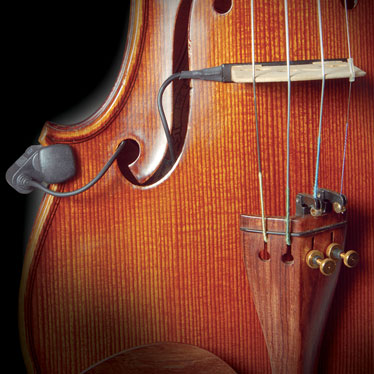What Is A Violin Pickup And Why Would I Use One?

Students who want to play in a professional capacity will learn quickly that being heard on stage in the midst of other instruments requires some specific amplification. In rock, pop, jazz, and country music genres, it’s hard for an acoustic violin to make itself heard over the electric sounds. For that reason, most career musicians are familiar with a violin pickup. Yet, for beginner students who are being classically trained, a pickup can seem odd and incongruous with the instrument.
Actually, the pickup is just another tool to help enlarge your musical abilities. It’s not complicated to understand or use, and there are tons of different styles that will fit your performance needs and comfort. If you’re playing in a band, you know that microphones are essential. A violin pickup is essentially a microphone that attaches to your instrument and amplifies your sound. Plus, pickups produce a superior sound.
What is a Pickup?
A pickup is a small tool that attaches to the bridge area of your violin. It actually operates on the same premise that your violin does. As the physical vibration travels from the strings to the bridge, then moves to the soundpost and bass bar, the pickup actually “feels” the vibrations created by the strings.
The electronic attachment transfers the vibration it detects to a digital signal. It’s the same signal as the frequency of the note, like when you tune your instrument. Pickups (aka transducers) capture the vibrations made by your strings and convert it into a signal that can be amplified or recorded.
Why should you use a violin pickup?
Don’t be afraid of these tools. A pickup ensures that you get heard when you’re playing with a large group of musicians hooking up their instruments to amps. A microphone just doesn’t offer the same clarity and strength of sound.
There are a number of reasons why violinists use a pickup. Knowing what a pickup can do will help you understand why it’s a vital tool for many string players. Pickups are available in a variety of models and brands. The following information explains a few reasons why you should consider one.
- You play with other electric instruments—Pickups provide the volume that your acoustic violin just can’t produce. When you play solo on stage, the tones are easy to distinguish, but in a band, your violin can be drowned out by guitar, drums, and vocals.
- A microphone is difficult and cumbersome—Playing in front of a microphone just doesn’t amplify the sound very well. Sure, your notes will be heard, but they won’t be as nuanced, rich, or beautiful. With a pickup, the tones ring true and crystal clear.
- You want to modify the sound of your violin while you’re on stage—In this case, a pickup is used in conjunction with a DI box and amp. This gives you the ability to plug directly into the house mixing board without an amplifier (a mixer tweaks sound sources or channels). Plus, you can transmit two different signals. One for the audience mix, and one for your own mixing on stage. A direct box (DI) works best with a house PA system. If this seems a little complicated, just remember that the pickup opens new sound possibilities for you as a performer.
- You want to make recordings that sound professional—A pickup changes the vibrations your violin makes into clear digital signals, so it makes it easy to record your performances without any background interference.
- You want to slightly alter the timbre of your violin for specific songs—Depending on what type of pickup is used and where it’s placed on your violin, you can alter the voice of your instrument. Create an exaggerated midrange response with some types of piezo pickups.
Really do your research if you are interested in using pickups as a way to amplify the sound your violin can make. Also, you should have a professional do the initial installation, even if the model you choose is detachable.
If you decide to try one out, finding the right pickup can open up a world of possibilities as a musician. Talk to your instrument dealer or other violinists you know who can offer practical advice on the type of pickup that will work best for you.


